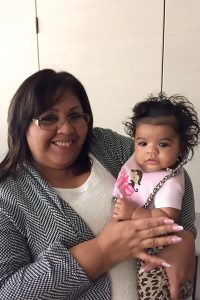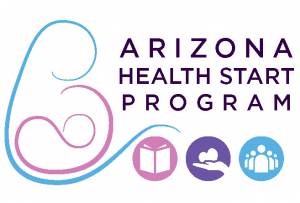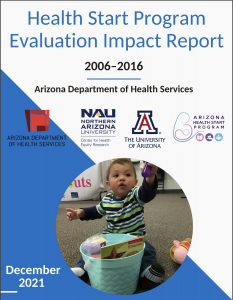Arizona Health Start Program
Overview of the evaluation
The Arizona Health Start Program is a community health worker (CHW) intervention that aims to improve maternal and child health outcomes through health education, referral support, and advocacy services for at-risk pregnant and postpartum women with children up to age 2.
In 2017, researchers from Northern Arizona University and the University of Arizona partnered with the Arizona Department of Health Services to initiate a retrospective evaluation of Health Start.
The purpose of the evaluation study is to assess the impact of Arizona’s longstanding Health Start Program on maternal and child health outcomes and to contribute to the evidence that may help support the Department of Health and Human Services criteria for Home Visiting Evidence of Effectiveness (HomVEE).
Utilizing 11 years of data and propensity score matching methodology, the evaluation team compared records from over 7,200 women enrolled in Health Start during 2006–2016 to approximately 54,000 women who did not participate in the program.
Analyses included the following subgroups:
- Hispanic/Latina and American Indian mothers
- Mothers living in rural border communities
- Mothers with less than a high school education
- Teen and first-time (primipara) mothers
- Mothers with pre-pregnancy health risks (e.g., diabetes, hypertension)
Evaluation results
The evaluation team tested their central hypothesis: mothers and children exposed to Health Start experience improved prenatal care attendance rates, birthweight rates, and early childhood vaccination rates.
Aim 1: Prenatal care
 Participation in Health Start during 2006–2016 is associated with statistically significant increases in prenatal care attendance for several subgroups compared to their matched controls.
Participation in Health Start during 2006–2016 is associated with statistically significant increases in prenatal care attendance for several subgroups compared to their matched controls.
Overall, Health Start participants were 24% more likely to report any prenatal care compared to the control group. The rates of any prenatal care were higher among specific subgroups: American Indian mothers (122%), primipara mothers (64%), teen mothers (58%), and mothers from rural border counties (45%).
Health Start participants were 8% more likely to report adequate prenatal care compared to the control group. The rates of adequate prenatal care were higher among specific subgroups: teen mothers (31%), mothers from rural border counties (18%), primipara mothers (18%), and mothers with less than high school education (13%).
Aim 2: Birthweight and preterm births
Participation in Health Start during 2006–2016 is associated with statistically significant decreases in low birthweight outcomes for several subgroups compared to their matched controls.
Health Start participation is associated with a lower low birthweight rate for American Indian mothers (38%) and mothers with a pre-existing health risk (25%) compared to control groups. Among Latina mothers, Health Start participation is associated with a 36% lower very low birthweight rate and 62% lower extremely low birthweight rate.
Additionally, Health Start participation is associated with a 30% lower preterm birth rate for teen mothers.
Aim 3: Early childhood vaccination
Participation in the Health Start Program during 2006–2016 is associated with statistically significant increases in immunization rates across several subgroups compared to their matched controls.
Vaccination completion rates (by age 5) were 5.0 percentage points higher for Health Start children as a group, and on average, 5.0 percentage points higher for several subgroups of mothers: mothers from rural border counties (ATT 5.8), Latina mothers (ATT 4.8), American Indian mothers (ATT 4.8), mothers with less than high school education (ATT 5.0), teen mothers (ATT 6.1), and primipara mothers (ATT 4.5).
Current and future evaluation activities
In 2022, the evaluation team proposed further evaluation of Health Start impact on maternal chronic diseases (Aim 4) and depression (Aim 5). The team will assess the programmatic impact among women insured by Arizona Medicaid, and whether the CHW home visiting program has a particular effect among this group of women.
They will apply propensity-score matching (the same methodology used to evaluate Aims 1–3) to identify comparison groups comprised of mothers never enrolled in Health Start, over the study period 2008–2019.
More about the Arizona Health Start Program Accordion Closed
The Arizona Health Start Program is operated by the Arizona Department of Health Services (ADHS), Bureau of Women’s and Children’s Health (BWCH). Health Start is currently offered in 14 communities across the state of Arizona to better address the socio-behavioral healthcare needs that many high-risk pregnant women and their families may experience.
The program utilizes community health workers (CHWs) to provide education, support, and advocacy services to pregnant/postpartum women and their families in targeted communities across the state. The CHWs live in and reflect the ethnic, cultural, and socioeconomic characteristics of the communities they serve. Clients receive home visits and case management through pregnancy and until their child’s second birthday.
Pregnant clients are connected to prenatal care providers and receive ongoing education about fetal development and health behaviors that can impact birth outcomes. CHWs screen, refer, and assist their clients with identifying and accessing various services as needed. CHWs educate parents about child development, immunizations, home safety, and vehicle safety. Health Start CHWs acquire new skills and knowledge on an ongoing basis to ensure they are providing the most accurate information.
Find a Health Start Program site near you here!
Meet the evaluation team Accordion Closed
Samantha Sabo, DrPH, MPH
Associate Professor
Center for Health Equity Research, NAU
Contact

Kelly McCue Nation, MPH
Senior Research Coordinator
Center for Health Equity Research, NAU
Contact
Patrick Wightman, PhD, MPP
Director of Health Analytics, Center for Population Science & Discovery
University of Arizona
Contact
Jessica Stewart-Gonzalez, MPA
Chief, Office of Children’s Health
Arizona Department of Health Services
Martín Celaya, DrPH, MPH
Chief, Bureau of Assessment and Evaluation
Arizona Department of Health Services
Contact
Reports, briefs, and technical appendices Accordion Closed
Publications Accordion Closed
Sabo S, Butler M, McCue K, Wightman P, Pilling V, Celaya M, Rumann S, Evaluation Protocol to Assess Maternal and Child Health Outcomes Using Administrative Data: a Community Health Worker Home Visiting Programme BMJ Open Medical Journal, 2019 9:e031780. doi:10.1136/bmjopen-2019-031780
Sabo S, Wightman P, McCue K, Butler M, Pilling V, Jimenez D, Celaya C, Rumann S. Addressing maternal and child health equity through a community health worker home visiting intervention to reduce low birth weight: retrospective quasi-experimental study of the Arizona Health Start Programme. BMJ Open 2021;11:e045014. doi:10.1136/bmjopen-2020-045014





